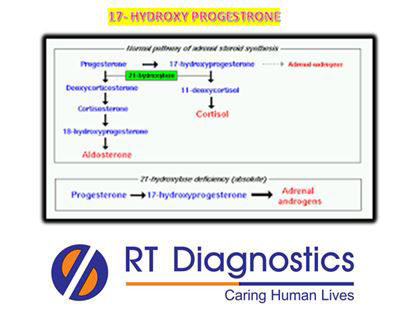17-OH PROGESTERONE (17 – OHP)
17-OH Progesterone (17 – OHP) –This hormone is a metabolite of Cortisol steroid hormone synthesis. This test estimates the level of 17-OHP in the blood for screening, evaluating the treatment of Congenital Adrenal Hyperplasia (CAH). This is the regular test in new born to detect congenital abnormalities.
CLINICAL INFORMATION :
The 17-OHP test is routinely ordered as a part of newborn screening to detect CAH due to 21-hydroxylase deficiency. Higher levels of 17-OH progesterone indicate a condition known as CAH. It is a glandular disorder in the adrenal glands which is unable to produce sufficient cortisol and may increase the production of male sex hormones (androgens). In women, typically day 21 to 23 serum progesterone concentrations remain high indicating ovulation.
This test is usually done as indicated by the physician from the signs and symptoms of these hormone-related disorders. This test is suggested in patients with symptoms of breast tenderness, bloating, food craving, increased nipple sensitivity, headache and muscle aches, etc. Other associated tests include Radio immune assay, ELISA, spectrometry, etc.

General instructions:
Sample Requirement: Specimen - Blood sample drawn from the vein. Test Preparation: None.
NOTE - Sample for specimen collections may vary based on the patient’s condition/cases according to the patient’s presenting complaints/signs or symptoms:
SPECIMEN REQUIREMENT (Special or Rare Cases) - As instructed and guided by Physician / Clinician / Pathologist / as per Laboratory’s requirements, according to procedures and protocols.
This Multi-Specialty Clinical Referral Laboratory “RTDIAGNOSTICS” provides precise and accurate tests with an extensive range of testing services to the medical centers to help in the diagnosis and identification of pathology in the test specimens for infectious diseases and also to evaluate the function of organ systems of the patient. It prevents further complications and helps to stabilize and restore health to near normalcy at the earliest without delay.



